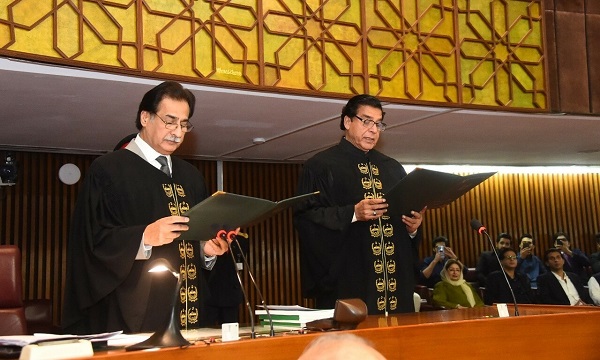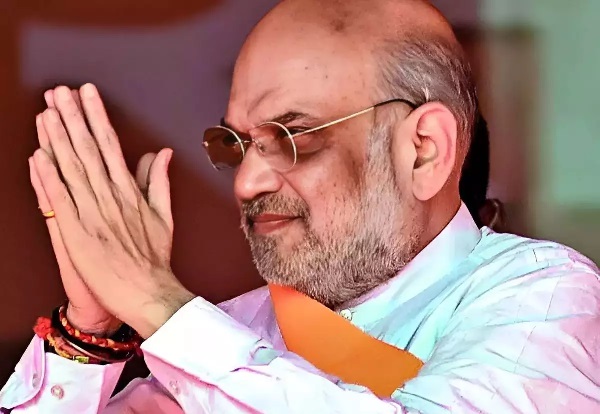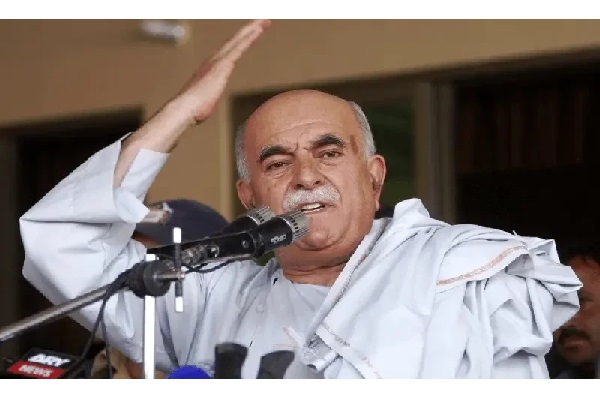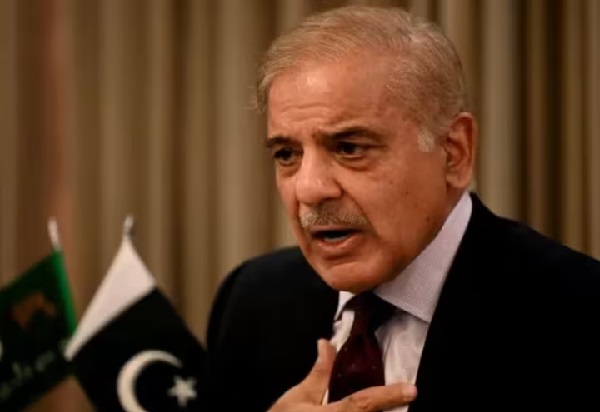NEW DELHI: Indian police said on Saturday they had arrested the social media chief of the country’s main opposition party over accusations
ISLAMABAD: Pakistan Peoples Party’s (PPP) Pervaiz Ashraf, who was administered the oath by Ayaz Sadiq of the Pakistan Muslim League-Nawaz (PML-N) as the new speaker after being elected unopposed, in his first order directed the NA Secretariat to present before him the case of the en masse resignations of 123 MNAs of the Pakistan Tehreek-i-Insaf (PTI), asking them to look into the matter in light of the past rulings of the chair and precedents.
The order was passed by Mr Ashraf after some members, including former speaker Ayaz Sadiq, said that former deputy speaker Qasim Suri had not followed the rules and had accepted the resignations without calling the members individually for verification as per his previous ruling as the speaker which was later also upheld by the courts.
Mr Sadiq said the resignations were on “cyclostyle paper”, instead of handwritten. He claimed that he had received calls from the PTI members who said they did not want to resign and that they had done so under pressure.
Mr Ashraf took the oath amid slogans like Jiye Bhutto and Aik Zardari Sab Pe Bhari from the party activists sitting in the galleries.
PPP Chairman Bilawal Bhutto-Zardari in his speech several times used the term “joint opposition” for the treasury members and later corrected himself by saying that they were now a “united government”. He said all institutions that were controversial in the past now had to make the transition toward becoming constitutional.
The office of the speaker had fallen vacant after Asad Qaiser tendered his resignation in line with the PTI’s decision, minutes before the voting on the no-confidence resolution against then prime minister Imran Khan on April 9.
In their speeches, the coalition partners presented their demands before the new government while expressing the hope that unlike the previous government, Mr Sharif would pay special attention towards them.
Sardar Akhtar Mengal of the Balochistan National Party (BNP-M) drew the attention of the prime minister towards the missing persons’ issue.
“I request the prime minister to resolve the missing persons’ issue before Eid,” said Mr Mengal. He also asked Mr Sharif to hold inquiry into a recent incident in Taftan town of Balochistan where law enforcement agencies had allegedly opened fire on some protesters.
Independent MNA Ali Wazir criticised the policy of declaring the people as traitors and raised the question on the independence of judiciary.
Some MNAs from Punjab drew the attention of the government towards agricultural problems whereas the lawmakers from Sindh called for judicious distribution of water according to 1991 Accord.
At the outset of the sitting which had been called for voting on the no-confidence resolution against Mr Suri, the house was informed by Mr Sadiq, who was presiding over the session as a member of the panel of chairmen before administering the oath to Mr Ashraf, that there would be no voting on the no-trust resolution as the deputy speaker had already submitted his resignation.
In his two-page resignation submitted minutes before start of the sitting, Mr Suri stated that his decision to quit as the deputy speaker symbolised his “party’s vision, glorious legacy and commitment to democracy, never to compromise on the sovereignty and integrity of Pakistan and its firm resolve never to compromise on that legacy of going to any lengths in fighting for and safeguarding the interests and independence of our country”.
Mr Suri, who had disallowed voting on April 3 on the no-confidence resolution against Imran Khan through a controversial ruling that was declared unconstitutional by the Supreme Court, in his resignation stated that “the past few days have proven and established beyond a shadow of any doubt that the motion of no-confidence against the former prime minister was linked and had a clear nexus; with the efforts of a foreign state, who with the help and support of local Mir Jafars, in the garb of a constitutional parliamentary process, have succeeded in their nefarious designs to oust a democratically-elected prime minister and the government; severely undermining the independence and sovereignty of our great country”.
Defending his ruling, Mr Suri wrote that the April 14 press conference of the military spokesman had made it clear that “there has been a blatant foreign interference/involvement in the internal affairs of Pakistan”.
In his inaugural speech as speaker, Mr Ashraf vowed to uphold constitutional and parliamentary supremacy, saying that it would be his utmost priority to revive the sanctity and impartiality of the parliament.
Mr Ashraf, who had served as the country’s prime minister during the previous PPP government, said that he considered it his duty to not to let the voice of the opposition got suppressed.
After taking the oath and delivering a written speech, Mr Ashraf gave floor to the parliamentary leaders and MNAs to speak on points of order. The speaker also gave floor to a number of PTI dissidents who delivered speeches as members of the opposition. Besides them, Ghaus Bux Mehr of the Grand Democratic Alliance (GDA) also spoke while sitting on the opposition benches.
Mr Mehr expressed the hope that the house would not have an “artificial opposition leader”.
In their speeches, the PTI dissidents named their forward bloc as “PTI Democratic Group” and assured the new government that they were ready to cooperate with it, provided they were given equal status as the members of the parliament.
You May Also Like
LAHORE: A delegation of Tehreek-i-Tahafuz-i-Aien (movement for protection of constitution), led by its president Mahmood Khan Achakzai,
LAHORE: As Prime Minister Shehbaz Sharif pledges to “protect the interests of farmers at all costs”, the federal government appears reluctant






